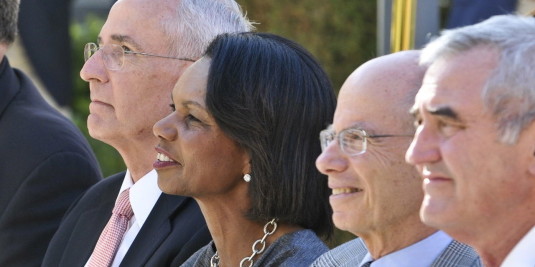
Colleagues gathered at a reception to honor Coit Blacker for his decade of leadership at FSI. From left to right: Blacker, Condoleezza Rice, Stephen Krasner and Ronald Spogli. Photo Credit: Rod Searcey
He’s been a presidential adviser, academic administrator, scholar and mentor. But listening to those who best know COIT BLACKER talk about his professional achievements is to hear people describe a close friend nearly everyone calls “Chip.”
“One of the reasons Chip has been so successful as a leader is that he is simply a good guy,” said CONDOLEEZZA RICE, professor of political science and of business, who first met Blacker at Stanford in the early 1980s – long before she would become the university’s provost and later serve as President GEORGE W. BUSH’s secretary of state.
“Great leaders are first and foremost good people,” Rice said.
After a decade leading Stanford’s Freeman Spogli Institute for International Studies (FSI), Blacker is stepping down from the position on Aug. 31. He will be succeeded by President Emeritus GERHARD CASPER.
Following a yearlong sabbatical, Blacker plans to return to campus and continue teaching about foreign policy – a topic he mastered through academic research and as President BILL CLINTON’s special assistant for national security affairs and senior director of Russian, Ukrainian and Eurasian affairs at the National Security Council.
Reading letters written by Clinton, former national security adviser SANDY BERGER and MICHAEL McFAUL – the U.S. ambassador to Russia and FSI senior fellow who studied closely with Blacker – Rice capped a lineup of colleagues, students and donors who honored the departing director during a recent farewell reception at the Cantor Arts Center.
“Under your directorship, the institute has enhanced its status as one of the globe’s most prominent and influential centers for the study of international relations,” Clinton wrote. “The institute’s research is helping us move toward a more stable, sustainable and equitable world in this age of interdependence. In addition to your devotion to Stanford, I will always be grateful for your outstanding work at the National Security Council during my presidency.”
Nearly 20 years before joining the Clinton administration in 1995, Blacker arrived at Stanford as a postdoctoral fellow in the university’s Arms Control and Disarmament Program. He lectured and taught through the 1980s, becoming a popular professor known for working closely with his students.
“I saw in him a mentor who not only excelled in his field, but did so with intellectual fortitude, integrity and a deep-seated sense of service to which I only hoped I could aspire,” said THEO MILONOPOULOS, a former student of Blacker’s who is now a Fulbright Scholar at King’s College London.
In 1991, Blacker became a senior fellow at the Institute for International Studies, the precursor to FSI. He was appointed as the institute’s deputy director in 1998 and took over as director five years later.
Under Blacker’s tenure, FSI expanded its number of research centers from four to seven, and grew its faculty from 21 to 32 professors. The institute’s endowment is nearly $200 million, up from $122 million in 2002.
“FSI has really become the jewel in the crown of Stanford’s interdisciplinary institutes under Chip’s leadership,” said ANN ARVIN, Stanford’s dean of research. “I hesitate to say how many times I have advised others to just ask Chip how they do it at FSI – whatever ‘it’ may be.”
Read the full story by ADAM GORLICK, FSI’s communications manager, on the institute’s website.